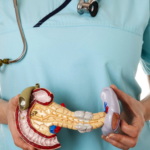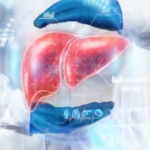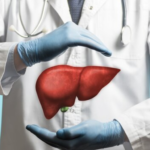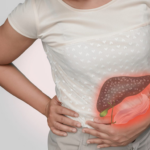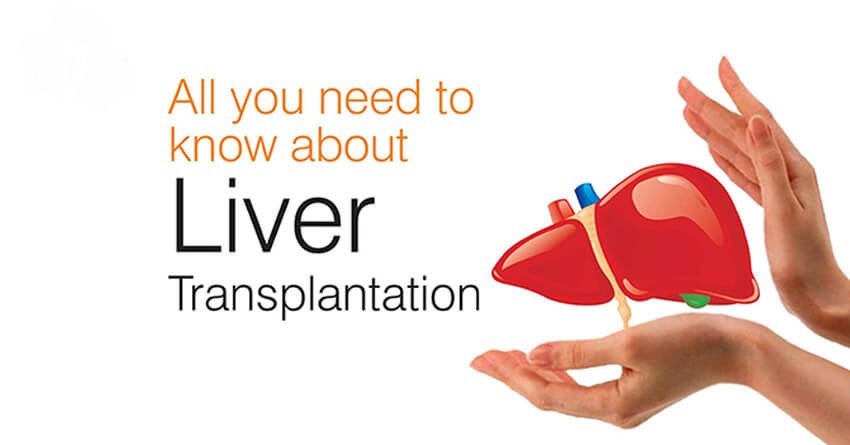
When the liver is too damaged to fulfill its functions, one last possibility remains transplant. It consists of replacing the diseased liver with a healthy one, taken ( most of the time) from a donor who’s brain dead.
To find out who can benefit from a transplant, two questions must be answered
Is the transplant justified?
And if so, does the patient have priority?
In which cases is a liver transplant justified?
A transplant is considered when the liver is no longer suitable to fulfill its vital functions.
For example
In the case of advanced cirrhosis (decompensated cirrhosis),
In the case of liver cancer.
Who has priority?
Since there aren’t enough transplants, priorities need to be set for the most seriously affected people to go before those who can wait. But to make the intervention successful, the general condition of the patient must allow the operation.
Too severe hepatic insufficiency increases the threat of operative and postoperative complications, and therefore the chances of survival, It’s considered that the transplant should be tried if the chances of survival at 5 times are at least 50.
In numerous countries, the main criteria used to objectify priorities in case of hepatic insufficiency is the Model for End-stage Liver Disease ( MELD) score, which integrates various parameters and crosses them with the origin of cirrhosis.
But this MELD score doesn’t say everything. It can – and should – also be supplemented by expert advice, taking into account specific criteria.
Long waiting and occasionally you get off of the list
Some people, indeed in decompensated cirrhosis, have difficulty accessing the transplant because other patients are in a worse situation than theirs.
The time spent on the waiting list is variable, but it can reach a year or more. Of course, careful monitoring of these people is essential (CT and MRI every three months). Still, also they come to a priority If their situation gets worse.
But with the new treatments for hepatitis C, another miracle may do some people eligible for a liver transplant and who have managed to get relieved of the virus see their situation improve to the point that they’re no longer considered as transplant candidates and leave the waiting list.
Strategies to deal with the shortage
To face the lack of grafts taken from people in brain death, several strategies are possible. Because of the very high regenerative capacity of the liver, a part of the organ can be taken from a living donor, or a liver can be divided between two donors.
The living donor
Organ donation by a living donor is substantially done for the kidney. But one can also consider a liver sample on the living donor. Since the liver is unique in its regenerative properties, it’s possible to take a part of the liver from a healthy donor and transplant it into a patient with liver disease. Over time, the partial liver transplant will develop into a fully functioning liver. The spouse of the recipient, his brothers or sisters, sons or daughters, grandparents, uncles or aunts, first cousins, and first cousins, and the partner of his father or mother may be authorized to advance.
The donor may also be any person bringing evidence of a life of at least two times with the recipient. Of course, the donor must be “ compatible” with the inheritable position. It must also be major and preliminarily informed by a committee of experts.
The split of the liver
It’s possible to divide a liver into two parts and implant each of these parts on a different recipient. Unfortunately, this split is rarely possible among two adults the part of the left liver, very small, can be grafted effectively only on a child or a very small adult.
The domino transplant
In the case of hereditary neurological disease related to the liver, a” domino” transplant can be performed. A person with this disease must ultimately benefit from an organ donation. But its own liver, although carrying the genetic anomaly, can be implanted on another person who urgently needs a transplant. The disease can also appear in the recipient, but numerous times later only.
The positive donor for hepatitis C virus
Now, with the progress of hepatitis C treatments, it’s possible to transplant otherwise healthy HCV infected livers into HCV infected donors. In this case, the patient will be treated for the HCV infection post-transplant, performing in a virus-free liver in a virus-free patient.
Daily life
Before the transplant, the waiting period can be extremely distressing for both patient and the surroundings. We don’t dare to leave, we have the phone permanently at hand, and we can feel helpless in the face of the advance of the complaint. It’s important not to be alone during these moments of doubt, and to be able to share them with third parties, psychologists, caregivers, or other patients.
The period preceding the operation can also be used to focus on the social situation of the person awaiting transplant, by meeting with a social worker from the hospital or transplant center, as soon as the pre-graft. You can also talk to a local social worker ( External Social Action Center, County Council, Social Security, etc.) present in some associations. It’s a useful way not to remain inactive while facing the disease, and to project yourself into post-transplant.
After the operation, a fully different period of life begins, always pointed by medical monitoring and medication.
Diet
After a liver transplant, you can get back an almost normal diet. Still, you must be extremely vigilant to prevent any food infection, because consequences can be particularly serious on a person under anti-rejection treatment.
Your diet should be varied, balanced, and as regular as possible, because of the constraints posed by the different medications (3 meals a day, and possibly 1 or 2 snacks). It should also consider antirejection drugs, including corticosteroids that promote fluid retention, weight gain, and diabetes.
Prevention from food infections
During the first six months following the transplant, you’ll also need
To exclude the following foods cold cut flesh, raw milk, and dairy products, raw and undercooked shellfish, smoked fish, trauma, picked seeds, raw or undercooked eggs, chocolate scum, homemade mayonnaise, delicatessen mayonnaise, vegetables raw or inadequately washed, meat and fish unheated or not cooked;
Banish ice cubes and filter decanters, which may be microbe nests;
Eat fresh by respecting the expiry dates and not keeping leftovers for more than a day in your refrigerator;
Respect the hygiene of the kitchen washes your hands before preparing or taking meals, regularly clean the refrigerator with bleach diluted in cold water.
Other rules
Hydrate yourself, while avoiding too salty waters that favor retention.
Forget alcohol, because of its toxicity on the liver.
Limit the consumption of sugar and sweet products (sugar, jam, chocolate, cookies, pastries, sodas …) to help excessive weight gain.
Avoid grapefruit whose factors interact with immunosuppressive therapy.
Physical activity
The recovery of physical exertion is important after the transplant because it makes it possible to fight against fat, arterial hypertension, and diabetes. Everyone has to choose an exertion adapted to their preferences and their health while avoiding violent practices that can harm the liver.
Soft out-of-door activities, similar to walking or cycling, are highly recommended, except during periods of intense heat and as long as you’re well hydrated.
In the first months, wearing a stage belt is needed to support the weak abdominal muscles after transplant.
Swimming addicts will have to reach the removal of the bile drain if it has been laid.
Daily health
Remember to cover your skin from the sun the fall of the immune defenses favors the occurrence of skin cancers. Consult a dermatologist once a year, and for any mole or button that changes shape or doesn’t heal.
Tell your doctor any fever over 38 ° C, any other sign of infection ( deep freeze, urinary tract infection, pimples on the skin, weight loss …), or anything that seems strange and unusual. Your immune defenses are weakened, so an infection needs to be treated quickly.
To limit the risks, it’s also important to be vaccinated (at least six months after the transplant), especially against influenza, hepatitis A and B, and pneumococcus. In contrast, all live vaccines are contraindicated ( yellow fever, BCG, MMR, live attenuated influenza, and chickenpox).
Eventually, be aware that some heavy dental operations, with risk of infection (an extraction for example), may justify the prescription of preventative treatment with antibiotics (but not any!).
Sexuality and pregnancy
There’s no medical contraindication to sex after a transplant. Still,anti-rejection treatments can also cause problems of libido or excitation ( erection, lubrication).
Transplantation restores the menstrual cycle, women of childbearing age should thus consider a system of contraception, which should be discussed with the doctor ( especially for the pill).
Pregnancy can be considered after a liver transplant, but it’s better to stay at least 1 year when the risk of rejection decreases. Immunosuppressive therapy will be maintained but may need to be modified. Such a project requires discussion between the hepatologist and the gynecologist, for an optimal follow-up.
Work
Work recovery depends of course on your condition and the nature of the work, but it shouldn’t be too early. The hepatologist sets the initial duration of your work cessation, but the date of recovery is the responsibility of the labor doctor. This recovery can be gradational, as part of a part-time therapeutic.
Driving
As for work, driving recovery must be progressive driving isn’t an insignificant act! Get along the first many times, and start with small trips.
Traveling
Before going on a trip, talk to the doctor who follows the transplant. You’ll have to
update your vaccinations ( still, live vaccines, such as yellow fever, are contraindicated to transplant donors); give your drug for the duration of the trip ( be careful, some are to be kept away from heat);
check that you’re covered for possible return As soon as you plan your trip, make an appointment with the doctor who ensures your follow-up transplant. Make sure your insurance covers medical charges and possible returns.
If you have more questions about Liver Transplantation, Consult a Liver specialist in Pune
Dr. Prasad Bhate is a well-known and experienced consultant Liver Transplant Surgeon in Pune, Hepatologist & Gastroenterologist at Aditya Birla Memorial Hospital, Thergaon, Pune. He is also the founder of Dr. Bhate’s Gastro Liver Clinic and heads the Department of Gastrology and Liver Transplant in Pune.
